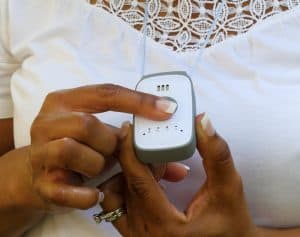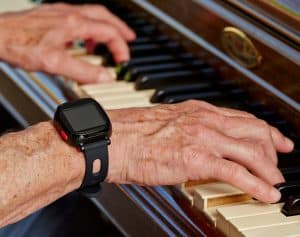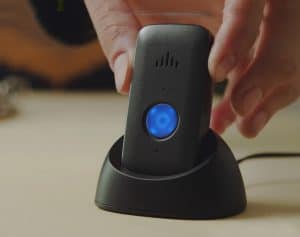
Image credit: Medical Guardian
It is always astounding to look back on certain products to see how far they have come in the past 10-50 years. Cell phones, for example, look and function completely differently than they did just a few decades ago. Medical alert systems have also changed drastically over the past 30 years thanks to technology advancements and the changing needs of active older adults like the Boomer generation. Read our up-to-date Lifeline review to get the latest medical alert system information.
If you have looked at medical alert systems ten years ago for a loved one, you will be pleasantly surprised at the advancements since then. Today’s medical alert systems are designed for seniors of all ages, abilities, and preferences. Tomorrow’s medical alert systems are already being designed, with companies poised at the forefront of innovation. Recently, we spoke to Aaron Leighton, Senior Marketing Manager at Medical Guardian, LLC to learn more about the past, present, and future of medical alert systems.
The Medical Alert Systems of the Past
Just 30 years ago, medical alert systems were mostly home-based. These devices were typically large and clunky, relying on traditional landline phone systems to communicate with emergency responders. The call button was linked to the system and the senior had to make it to the base station to ask for help.
Unfortunately, many older adults did not utilize the system for a variety of reasons. Companies that served seniors through medical alert technology had to find a new way to connect older adults with immediate emergency assistance.
Today’s Medical Alert Systems
According to Aaron Leighton with Medical Guardian, LLC, today’s medical alert system technology is anything but cumbersome. We asked him to highlight a few features that have evolved through 2020. “Today, we have landline, cellular, mobile, GPS tracking, fall detection, WiFi tracking, and more!” says Leighton. “All these innovations help to get customers not just protected, but the protection that’s best suited for them. Thanks to the introduction of cellular technology, WiFi, and GPS, medical alert systems are now more portable than ever. This means that older adults can feel protected and have peace of mind while in their homes, working in their yard, running on a favorite trail, or driving cross country to visit a friend.
According to Medical Guardian, today’s goal is to help seniors be protected as well as to help them find a system that works for their lifestyle and goals.
Beating Stereotypes

Today’s medical alert devices are discreet. Image credit: Medical Guardian
Medical alert systems are now as diverse as the seniors that use them daily. However, there are still some negative stereotypes or stigma that can keep older adults from pursuing this technology. Unfortunately, some seniors believe that using a medical alert system is a sign of weakness or frailty. The team at Medical Guardian works diligently to fight this stigma, innovating new designs that are even more discreet and fashionable. The new Mini Guardian, Medical Guardian’s latest device, is a perfect example of medical alert technology that is effective without being bulky or too noticeable.
The Medical Guardian team also knows the importance of messaging and marketing as they work to reverse negative stereotypes and show older adults the benefits of medical alert technology. “Here at Medical Guardian, we make sure we emphasize that a medical alert system actually enhances the independence of the person using it,” says Leighton.
The right medical alert system technology can bring safety and quality of life to active and homebody seniors, giving them peace of mind no matter where they are.
Considerations for Medical Alert System Technology
As companies like Medical Guardian look to the future and begin to develop products for tomorrow’s generation, they need to take a few things into consideration. The first is the increased health and activity of seniors. The Boomer generation is proving to the country that aging doesn’t have to slow a person down. Instead, Boomers are working, volunteering, hiking, biking, and swimming their way through retirement.
Medical alert system designers are noticing this difference and changing products to match those lifestyle choices. Longer battery life means older adults don’t have to feel tied to a charger. GPS and WiFi connection means seniors can get assistance no matter if they are at home or at the gym. Fall detection technology ensures a proactive approach if the older adult is unable to call for help on their own.

Longer battery life means seniors can be more active. Image credit: Medical Guardian
Another consideration is the ability for families to stay connected and aware of their aging loved one’s activity. The Medical Guardian products, for example, include the opportunity for seniors to designate people who can access their daily information. These caregivers can see if there was a fall or call for help via an app or on their desktop. This enhanced communication can help family members advocate for their loved ones from miles away.
Most importantly, medical alert system technology needs to be affordable. With many seniors living on a fixed budget, costs for any device must not be prohibitive. At Medical Guardian, the team focuses on creating new ways to make devices and technology affordable so that every senior can enjoy the protection and peace of mind medical alert systems offer.
Medical alert technology is adapting and changing as they get to know this next generation of seniors. They are working hard to ensure that seniors enjoy safety and independence while still pursuing their active lifestyle.
Medical Alert System Benefits
Have you wondered if a medical alert system or device is right for you? Many older adults are curious about the technology, but aren’t sure if the investment is worth it. There are plenty of reasons to make a medical alert system or device a part of your retirement plan:
- Immediate emergency assistance when you need it, where you need it
- Increased peace of mind
- More independence at home and outside of the home
- Investing in fewer hours of in-home care monthly
Perhaps best of all, today’s older adults can enjoy a variety of choices when it comes to medical alert systems and devices. This gives every senior the chance to choose a device that truly suits their lifestyle and preferences, enhancing their independence because assistance is just a push of a button away.
Looking to Tomorrow
What will tomorrow’s medical alert system technology look like? No one is certain, but the Medical Guardian team will continue to innovate and create products that serve seniors by keeping them connected and independent.


